
| Topic: | LBR LBO Debrief - Economic & Business Climate Outlook 2017 |
| Date/Time/Venue: | 29th November 2016 - OAK Room, Cinnamon Grand |
| Host: | Lakshaman Bandaranayake | Founding Publisher, Director | Lanka Business Online |
| Inquiries: | Lakshaman Bandaranayake | lakshaman@lbo.lk | 071 176 0167 or 072 776 0167 Hotline | 071 466 0060 | debrief@lbo.lk |
| Registration Fee: | (Pre VAT and NBT) Registration fee per participant for Individual or groups of less than 5 – Rs. 13,900 Registration fee per participant for groups of 5 or more and up to 9 – Rs. 13,200 Registration fee per participant for groups of 10 or more – Rs. 12,500 |
To Join the Discussion, Post your Comments/Questions
SMS: 077 753 8388 | Facebook: [Event] LBR LBO Debrief 2017 [Company] Lanka Business Online | Twitter: @lbolbr | Use Hashtag: #LBRLBODebrief | Google Plus: +lbrlbo | YouTube: lbrlbo | Pinterest: lbolbrevents | Instagram: lbrlbo×
Download "LBR LBO EVENT Companion" from Google Play or Apple Store. The mobile app, developed by CakeLabs, gives you easy access to all the important information on the Summit. You can use the mobile app to post questions and comments on each session.×
Description
INSIGHTFUL AND THOUGHT-PROVOKING SPEECHES AND PANEL DISCUSSIONS In a world of increasing economic integration, no business executive, investor, and public sector official, academic or researcher can afford to be oblivious to the pulse of the economy- global, regional and local. However, making sense of a rapidly evolving political-economic scenario is a daunting task. With this in mind, the 2016 edition of LBR LBO Debrief have invited over fifteen Economists, researchers, public sector officials and leading corporate to critically discuss, debate and deliberate. The insightful and thought provoking presentations and panel discussions will focus on: 1) Critical examination of the outlook of world economy, the state of play of key economies and what one can expect in the Sri Lankan economy. 2) Insightful perspectives on the rapidly changing global security and political order 3) How the evolving political economic scenario will impact Sri Lankan business and economy 4) What the Budget of 2017 would mean to the industry and economy 5) How business leaders will navigate and steer their enterprises in 2017 UNFOLDING ECONOMIC & GEOPOLITICAL SCENARIO Global growth is set to remain in a low-growth trap According to the OECD Economic Outlook and Interim Economic Outlook (September, 2016) the world economy remains in a low-growth trap, with poor growth expectations depressing trade, investment, productivity, and wages. This in turn leads to a further downward revision in growth expectations and subdued demand. OECD estimates global GDP growth to remain flat around 3% in 2016 with only a modest improvement projected in 2017. This forecast is based on weaker conditions in advanced economies, including the effects of Brexit, offset by a gradual improvement in major emerging market commodity producers. The effect of Brexit on the global economic landscape cannot be ignored. In the “World Economic Update of July 2015”, The International Monetary Fund cut its forecasts for global economic growth this year and next, as the unexpected vote by the UK to leave the European Union created a wave of uncertainty amid already-fragile business and consumer confidence. “The Brexit vote implies a substantial increase in economic, political, and institutional uncertainty, which is projected to have negative macroeconomic consequences, especially in advanced European economies,” observed the IMF’s World Economic Outlook Update. (July 19, 2016) The IMF predicts that global growth will remain muted. The global economy is projected to expand 3.1 percent this year and 3.4 percent in 2017, according to the IMF. In the U.S, weaker-than-expected growth in the first quarter prompted the IMF to reduce its 2016 forecast to a gain of 2.2 percent. The Eurozone fragility continues. The driver of its recovery, domestic demand, has lost traction. The result was slowing down of GDP. The Chinese economy is gradually shifting gears after 30 years of breakneck double-digit economic expansion, which has lifted millions of Chinese from abject poverty. The rebalancing of the Chinese economy from one that is primarily labor-intensive, investment-led and export-oriented to one based on value-added production, services and domestic consumption is under way. In China, the return of expansionary fiscal policy, rate cuts introduced in 2015, growths in infrastructure investments and credit expansion have had a positive impact. Given the limited trade with the U.K, the impact of Brexit on China is expected to be limited. The outlook of Emerging markets and Developing Economies (EMDEs) is diverse. Global Economic Prospects (June 2016) of World Bank observed that the growth disappointments in 2015 have extended into 2016. Overall, the outlook of EMDEs is not buoyant due to a significant downward revision in commodity prices, weak global trade, volatile capital flows, and persistent domestic challenges. According to the World Bank, growth in South Asia- primarily driven by the Indian and Bangladeshi economies- is expected to reach 7.1 percent in 2016, and to strengthen to 7.3 percent by 2018, underpinned by robust domestic demand. In the near term, consumer spending continues to benefit from low oil prices and modest inflation rates, although these effects will wane in the medium term. An accommodative monetary stance, public investments in infrastructure, and progress on the structural reform agenda should support growth. On the external front, volatility in financial markets could lead to large capital outflows from the most vulnerable emerging market economies in the region. Lower remittance inflows could dampen consumption spending and the growth outlook in the region’s smaller economies. Domestic risks include slower-than-expected progress in structural reform, vulnerabilities in bank and corporate balance sheets, and fiscal challenges. The double whammy of economic sanctions and low oil prices continues to affect the growth prospects of Russia. Negative growth is expected to continue in 2016, following the extension of sanctions and the renewed fall in the oil price. The military excursions in the Middle East are likely to worsen Russia’s fiscal challenges. Pains of regime change continues At home, getting adjusted to the regime change has not been easy. The change of government on the 8th of January 2015 has its positive effects on political atmosphere and foreign policy. Sri Lanka was able to improve its relations with India and the West. The government, which came to power with the overwhelming support of the minorities, brought renewed hopes of ethnic reconciliation. While the new government earned much in goodwill - both domestically and internationally –as it came to power, its economic performances have been less than encouraging. The expectations of many have failed to materialize. The vociferous joint opposition and not-so-covert tensions among the parties in the “Unity Government” have also brought in an element of political unease. Lack of a robust economic plan was evident in the absence of much needed reforms in many sectors. Improved foreign-relations have not resulted in the anticipated rush of FDI. The government lacks imagination in the area of economic strategy. According to Central bank of Sri Lanka, real economic growth in 2015 registered 4.8%, compared with 4.9 percent in 2014. A slowdown in the growth of demand in Sri Lanka’s traditional export markets impacted the growth of the export sector while a strengthening US economy prompted short-term capital outflows. The Central Bank in its annual report of 2015 further observed that despite substantial gains from the lower oil prices and continued positive trends in the tourism sector, the slowing down of net foreign exchange inflows (including worker remittances) and capital outflows, generated an overall deficit in the balance of payments (BOP). Exports fell by 6% in USD terms between the first half of 2015 to 2016. The imports of USD 16.1Billion as against exports of USD 8.8 Billion resulted in a negative trade balance of USD 7.1 Billion. The economic turmoil in oil producing Gulf Cooperation Council (GCC) countries due to suppressed oil prices is likely to hurt the remittances from overseas workers. Remittances are just below 10% of GDP, 50% of which comes from Gulf region. The decline in foreign direct investments (FDI) and loans to the government, banking and private sectors and the withdrawal of foreign investments from the government securities market, resulted in the balance of payments (BOP) recording a deficit of US dollars 1,489 million in 2015 resulting in the deterioration of the BOP. During the first half of 2016 Sri Lanka once again edged towards a BOP crisis, though subsequently the situation improved. The populist fiscal moves introduced since the new regime came to power coupled with below target collection of tax revenue have severely strained the budget deficit. The overruns on the expenditure side of the government budget and less than encouraging tax revenue resulted in a budget deficit 7.4 % (of GDP), as against the targeted deficit of 4.4%. All Share Price Index (ASPI) of Colombo Stock Exchange moved down from 7,100 in early October to 5,800 by mid-March 2016. Though there has been an upward swing, the ASPI is still 500 points below the October 2015 levels. There has not been a single significant development in the capital market ever since the new regime came to power. Business Sentiment Index (BSI) compiled by the Central bank of Sri Lanka (CBSL) showed significant erosion of entrepreneur confidence. The indices moved from 136 in the third quarter of 2014 to the lowest ever of 86 in the second quarter 2016. Uncertainties, mainly due to ad-hoc policy changes and lack of visible and tangible development efforts, have probably affected confidence among the business sector. Anti-free trade sentiments have been growing during the recent past. Various professional and trade bodies have shown stiff resistance to the proposed economic pact with India, challenging the government’s aim in closely integrating Sri Lanka’s economy with the global supply chain. One of the few positive developments is the growth in tourist arrivals and tourist industry earnings. As articulated by the Hon. Prime Minister, if Sri Lanka is to be the most competitive nation in the region, it is crucial to address the areas mentioned below, with a sense of national priority and earnestness. 1) Stimulate export and FDI growth; a key strategic imperative the government must address with a sense of urgency 2) Speed up the establishment of trade pacts with India, Singapore, China and other important economies 3) Resist the temptation for populist fiscal measures, widen the tax base and improve revenue management 4) Act with a sense of urgency to achieve visible and tangible economic progress 5) Institute structural reforms needed to move the country beyond the lower middle-income economy 6) Enhance productivity to meet the demographic challenges and move the economy up the value chain 7) Promote international trade and investment 8) Fight rising protectionism and truly integrate the economy with the region “LBR LBO DEBEIEF WILL BRING CLARITY TO THE ECONOMIC & BUSINESS CLIMATE OUTLOOK The fourth annual edition of “LBR LBO DEBRIEF” aims to provide much needed clarity on unfolding global, regional and local trends. LBR LBO DEBRIEF will be of immense value to anyone whose professional and academic role would require a comprehensive command of the state of Sri Lankan economy in 2017.Agenda
| 0830 - 1745 HRS on Tuesday 29th November 2016 at OAK ROOM, Cinnamon Grand, Colombo | ||||
| A concise overview of what one can expect in global economy, key economies and in Sri Lankan economy and business climate in 2017 | ||||
| 0730 – 0830 | Delegate check-in, Summit materials collection, networking breakfast | |||
| 0830 – 0845 | LBR LBO Debrief opening | |||
| Opening remarks, partner recognition and appreciation | ||||
| Lakshaman Bandaranayake | Founding Publisher/Director | Lanka Business Online (LBO) | ||
| 0845 – 0915 | KEYNOTE 1 | |||
| THE STATE OF GLOBAL ECONOMY AND CHALLENGES AHEAD | ||||
| Saurav Anand | South Asia Economist | Standard Chartered | ||
| 0915 – 0945 | KEYNOTE 2 | |||
| OUTLOOK AND STATE OF PLAY: US, UK, EURO ZONE, RUSSIA, JAPAN & CHINA | ||||
| Ralph Van Doorn | Senior Country Economist for Sri Lanka and the Maldives | World Bank | ||
| Global Practice for Macroeconomics & Fiscal Management, World Bank | ||||
| 0945 – 1015 | KEYNOTE 3 | |||
| OUTLOOK AND STATE OF PLAY: INDIA AND EMERGING ASIA | ||||
| Gunjan Gulati | Asia Economist | IFC | ||
| 1015 – 1040 | KEYNOTE 4 | |||
| THE SHIFTING GEO-POLITICAL LANDSCAPE AND IMPLICATIONS | ||||
| Paulius Kuncinas | Managing Editor, Asia | Oxford Business Group | ||
| 1040- 1045 | Sponsor commercials | |||
| 1045 – 1115 | KEYNOTE 5 | |||
| OUTLOOK AND AN ASSESSMENT OF SRI LANKAN ECONOMY | ||||
| Amal Sanderatne | CEO | Frontier Research | ||
| 1115 – 1245 | PANEL DISCUSSION 1 | |||
| HOW WILL THE EVOLVING POLITICAL ECONOMIC SCENARIO IMPACT SRI LANKAN BUSINESS AND ECONOMY? | ||||
| Session Chair | Panelists | |||
| Ruvini Fernando | Gunjan Gulati | Amal Sanderatne | Suarav Anand | |
| Executive Director/Joint Managing Director | Asia Economist | CEO | South Asia Economist | |
| Guardian Fund Management | IFC | Frontier Research | Standard Chartered | |
| Panelists | ||||
| Ralph Van Doorn | Paulius Kuncinas | |||
| Senior Country Economist for Sri Lanka and the Maldives | Managing Editor, Asia | |||
| World Bank | Oxford Business Group | |||
| 1245 – 1330 | LUNCH | |||
| 1330 - 1400 | BUDGET 2017 HIGHLIGHTS | |||
| Deshal de Mel | Senior Economist | Hayleys Group | ||
| 1400-1530 | PANEL DISCUSSION 2 | |||
| WHAT THE BUDGET 2017 WOULD MEAN TO THE INDUSTRY AND ECONOMY? | ||||
| Session Chair | Panelists | |||
| Subhashini Abeysinghe | Eteri Kvintradze PhD | Shiran Fernando | Deshal de Mel | |
| Senior Analyst and Head of Economics | Resident Representative | Lead Economist and Senior Product Head | Senior Economist | |
| Verité Research | IMF | Frontier Research | Hayleys Group | |
| Panelists | ||||
| Arjuna Herath | Shashi Kandambi Jassim | |||
| Partner | Senior Deputy General Manager - Corporate Banking | |||
| EY | Sampath Bank | |||
| 1530 – 1600 | TEA / COFFEE | |||
| 1600 – 1730 | PANEL DISCUSSION 3 | |||
| BUSINESS LEADER ROUNDTABLE | ||||
| HOW WILL THE BUSINESS LEADERS NAVIGATE AND STEER THEIR ENTERPRISES IN 2017? | ||||
| Session Chair | Panelists | |||
| Kumudu Gunasekera PhD | Dee Liyanwela | Vajira Kulathillake | Mano Tittawella | |
| Director | Executive Director - Exchange Technology | Chairman | Chairman | |
| Stax | London Stock Exchange Group (LSEG) | Colombo Stock Exchange | EAP Holdings | |
| Panelists | ||||
| Rajitha Kariyawasan | ||||
| Managing Director | ||||
| Haycarb PLC | ||||
| 1730 - 1745 | Conclusion | |||
| 1745 - 1900 | Networking Reception | |||
Speakers
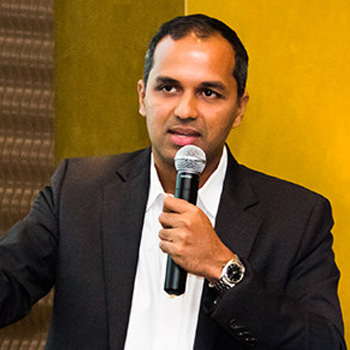 Kumudu Gunasekera PhD
Director @ Stax Inc
Kumudu Gunasekera, Ph.D., is a Director in the Singapore office where he works with our global teams to deliver actionable insights to clients worldwide.
Prior to joining Stax, Kumudu was a Principal with Parsons Brinckerhoff (Washington D.C.), the professional services arm of Balfour Beatty, a global infrastructure group that delivers services essential to the development, creation and care of infrastructure assets; from finance and development, through design and project management to construction and maintenance. At Parsons Brinckerhoff, Kumudu successfully led global, multi-disciplinary consulting teams on large (> $ 1 million) and small (< $ 1 million) strategic consulting assignments in Burkina Faso, Canada, Curacao, England, Mali, Nigeria, Panama, Scotland, Qatar, Sri Lanka, and the United States. He was the project director and chief model architect of PRISMTM proprietary (U.S patent pending) transportation software.
Kumudu was the founding editor (2006-2013) of the Economic Forecasting Review and a monthly columnist (2007-2013) of Roads & Bridges. Additionally, he has published numerous articles in peer-reviewed journals and industry magazines; has presented at conferences, workshops, focus groups, and stakeholder meetings in Canada, Pakistan, Panama, Scotland, Sri Lanka, and the United States; and has instructed numerous undergraduate, graduate, and professional courses.
Kumudu earned his Ph.D. in Economic Geography, and a joint M.A. in International Relations and Environmental Policy from Boston University. He has a B.A. in Economics from Hobart and William Smith Colleges.
Kumudu Gunasekera PhD
Director @ Stax Inc
Kumudu Gunasekera, Ph.D., is a Director in the Singapore office where he works with our global teams to deliver actionable insights to clients worldwide.
Prior to joining Stax, Kumudu was a Principal with Parsons Brinckerhoff (Washington D.C.), the professional services arm of Balfour Beatty, a global infrastructure group that delivers services essential to the development, creation and care of infrastructure assets; from finance and development, through design and project management to construction and maintenance. At Parsons Brinckerhoff, Kumudu successfully led global, multi-disciplinary consulting teams on large (> $ 1 million) and small (< $ 1 million) strategic consulting assignments in Burkina Faso, Canada, Curacao, England, Mali, Nigeria, Panama, Scotland, Qatar, Sri Lanka, and the United States. He was the project director and chief model architect of PRISMTM proprietary (U.S patent pending) transportation software.
Kumudu was the founding editor (2006-2013) of the Economic Forecasting Review and a monthly columnist (2007-2013) of Roads & Bridges. Additionally, he has published numerous articles in peer-reviewed journals and industry magazines; has presented at conferences, workshops, focus groups, and stakeholder meetings in Canada, Pakistan, Panama, Scotland, Sri Lanka, and the United States; and has instructed numerous undergraduate, graduate, and professional courses.
Kumudu earned his Ph.D. in Economic Geography, and a joint M.A. in International Relations and Environmental Policy from Boston University. He has a B.A. in Economics from Hobart and William Smith Colleges.
 Saurav Anand
Economist, South Asia @ Standard Chartered
Saurav is responsible for macroeconomic coverage of Bangladesh and Sri Lanka, as well as some aspects of India. He joined Standard Chartered in 2009 in Mumbai as an Equity Research Analyst and was primarily responsible for covering the Indian telecom, media, and oil and gas sectors. Saurav holds an MBA from the Indian Institute of Management, Calcutta, and an engineering degree from the Indian Institute of Technology, Delhi. He also holds FRM certification (GARP – USA) and has cleared CFA Level II.
Saurav Anand
Economist, South Asia @ Standard Chartered
Saurav is responsible for macroeconomic coverage of Bangladesh and Sri Lanka, as well as some aspects of India. He joined Standard Chartered in 2009 in Mumbai as an Equity Research Analyst and was primarily responsible for covering the Indian telecom, media, and oil and gas sectors. Saurav holds an MBA from the Indian Institute of Management, Calcutta, and an engineering degree from the Indian Institute of Technology, Delhi. He also holds FRM certification (GARP – USA) and has cleared CFA Level II.
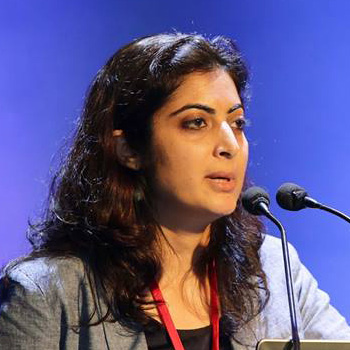 Gunjan Gulati
Asia Economist @ IFC
Gunjan, currently works as a Regional Economist, Asia for International Finance Corporation (IFC), based out of Mumbai. She joined IFC from JPMorgan, where she closely monitored the macroeconomic dynamics of the Indian subcontinent. Her work involved analyzing economic trends, forecasting key economic variables, writing research reports and active interaction with clients, government officials, policymakers as well as media. Prior to JP Morgan, she worked with CRISIL, a Standard and Poor’s company, working on diverse advisory and research opportunities involving, state level economic advisory and macro-economic advisory. She joined CRISIL as a campus placement after completing her Masters in Economics from Delhi School of Economics, Delhi.
Gunjan Gulati
Asia Economist @ IFC
Gunjan, currently works as a Regional Economist, Asia for International Finance Corporation (IFC), based out of Mumbai. She joined IFC from JPMorgan, where she closely monitored the macroeconomic dynamics of the Indian subcontinent. Her work involved analyzing economic trends, forecasting key economic variables, writing research reports and active interaction with clients, government officials, policymakers as well as media. Prior to JP Morgan, she worked with CRISIL, a Standard and Poor’s company, working on diverse advisory and research opportunities involving, state level economic advisory and macro-economic advisory. She joined CRISIL as a campus placement after completing her Masters in Economics from Delhi School of Economics, Delhi.
 Amal Sanderatne
CEO @ Frontier Research
Amal Sanderatne is the founder of Frontier Research, a provider of economic and sector research as well as curated information services. Frontier operates based on Amal’s core belief that time is our most precious and perishable resource and as such, believes in providing research and information products that are “Time efficient”
To achieve this, Frontier focus on making its products accessible and business friendly and believes in research that is concise and easy to understand. The fifteen economists and research associates at Frontier, work in a flexible work environment, where they can choose how to make the best use of their time.
Amal started his research career at Jardine Fleming HNB Securities Sri Lanka as an Economist; rising to the position of Head of Research and also worked for JP Morgan in Singapore leading JP Morgans's Asia Pacific ADR research.
Amal Sanderatne
CEO @ Frontier Research
Amal Sanderatne is the founder of Frontier Research, a provider of economic and sector research as well as curated information services. Frontier operates based on Amal’s core belief that time is our most precious and perishable resource and as such, believes in providing research and information products that are “Time efficient”
To achieve this, Frontier focus on making its products accessible and business friendly and believes in research that is concise and easy to understand. The fifteen economists and research associates at Frontier, work in a flexible work environment, where they can choose how to make the best use of their time.
Amal started his research career at Jardine Fleming HNB Securities Sri Lanka as an Economist; rising to the position of Head of Research and also worked for JP Morgan in Singapore leading JP Morgans's Asia Pacific ADR research.
 Shiran Fernando
Lead Economist and Senior Product Head @ Frontier Research
Shiran is at present the Lead Economist and Senior Product Head at Frontier Research. He leads the growth and strategic direction of the economics research division of Frontier Research. He is a member of the Economic Policy Committee of the Ceylon Chamber of Commerce and also a member of the Investment Climate Sub-Committee of the National Agenda Committees of the Ceylon Chamber of Commerce. Shiran is an alumni of University of London International Programmes with a BSc. In Economic and Finance and a CIMA passed Finalist.
Shiran Fernando
Lead Economist and Senior Product Head @ Frontier Research
Shiran is at present the Lead Economist and Senior Product Head at Frontier Research. He leads the growth and strategic direction of the economics research division of Frontier Research. He is a member of the Economic Policy Committee of the Ceylon Chamber of Commerce and also a member of the Investment Climate Sub-Committee of the National Agenda Committees of the Ceylon Chamber of Commerce. Shiran is an alumni of University of London International Programmes with a BSc. In Economic and Finance and a CIMA passed Finalist.
 Eteri Kvintradze PhD
Resident Representative @ IMF
Ms. Eteri Kvintradze is Resident Representative for Sri Lanka and Maldives. Before her current assignment, she was Resident Representative in Bangladesh, where the Fund has successfully engaged in its largest Extended Credit Facility program. A national of Georgia, Ms. Kvintradze joined the Fund as a mid-career economist. She worked on designing new IMF lending facilities and debt limit policies, worked on Mozambique and Sri Lanka programs. Before joining the Fund, she served as Deputy Minister of Finance in Georgia. She also worked as an advisor to the Executive Director for Netherlands Constituency at the World Bank Board. Ms. Kvintradze studied international economics at Tbilisi State University, holds MA in Development Economics from Williams College, and PhD in Economics from Georgetown University.
Eteri Kvintradze PhD
Resident Representative @ IMF
Ms. Eteri Kvintradze is Resident Representative for Sri Lanka and Maldives. Before her current assignment, she was Resident Representative in Bangladesh, where the Fund has successfully engaged in its largest Extended Credit Facility program. A national of Georgia, Ms. Kvintradze joined the Fund as a mid-career economist. She worked on designing new IMF lending facilities and debt limit policies, worked on Mozambique and Sri Lanka programs. Before joining the Fund, she served as Deputy Minister of Finance in Georgia. She also worked as an advisor to the Executive Director for Netherlands Constituency at the World Bank Board. Ms. Kvintradze studied international economics at Tbilisi State University, holds MA in Development Economics from Williams College, and PhD in Economics from Georgetown University.
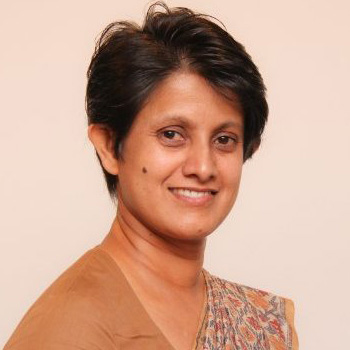 Subhashini Abeysinghe
Senior Analyst and Head of Economics @ Verité Research
Subhashini Abeysinghe is an economist specializing in international trade. She is an expert on Sri Lankan economy, private sector development, economic and trade policy, trade regulations, non-tariff barriers, trade facilitation, WTO and regional trade agreements. She has a Bachelor’s Degree in Economics (first class honors), a Master’s Degree in Economics from University of Colombo, and a Master’s Degree in International Law and Economics (Summa cum Laude) from World Trade Institute, University of Bern, Switzerland. Since 2013, Subhashini has been working as a Senior Analyst heading the economic research team of Verité Research, a research and strategy firm based in Colombo. She has worked for the Ceylon Chamber of commerce (CCC) for nearly 10 years as a senior economist. She has worked as a consultant for the World Bank, Asian Development Bank, USAID, GIZ and a number of private and public organizations.
Subhashini Abeysinghe
Senior Analyst and Head of Economics @ Verité Research
Subhashini Abeysinghe is an economist specializing in international trade. She is an expert on Sri Lankan economy, private sector development, economic and trade policy, trade regulations, non-tariff barriers, trade facilitation, WTO and regional trade agreements. She has a Bachelor’s Degree in Economics (first class honors), a Master’s Degree in Economics from University of Colombo, and a Master’s Degree in International Law and Economics (Summa cum Laude) from World Trade Institute, University of Bern, Switzerland. Since 2013, Subhashini has been working as a Senior Analyst heading the economic research team of Verité Research, a research and strategy firm based in Colombo. She has worked for the Ceylon Chamber of commerce (CCC) for nearly 10 years as a senior economist. She has worked as a consultant for the World Bank, Asian Development Bank, USAID, GIZ and a number of private and public organizations.
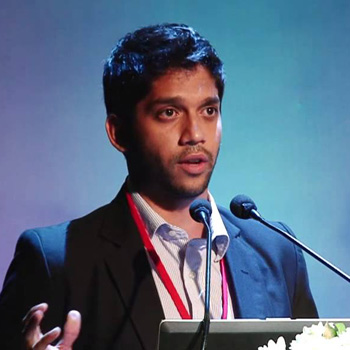 Deshal de Mel
Economist @ Hayleys
Mr. Deshal de Mel presently works for the Hayleys Group as its Senior Economist. Prior to joining Hayleys, he worked for the Institute of Policy Studies, Sri Lanka. His research has been published in a number of books and journals. Along with policy research, Mr. de Mel has also represented the Government of Sri Lanka in inter-governmental trade negotiations. He has a degree in Philosophy, Political Science and Economics from the University of Oxford, UK, and a Master’s in International Political Economy from the London School of Economics, UK. He serves on the Board of Directors of Sampath Bank PLC as a Non-Executive Director, and also serves on the Economic, Fiscal and Policy Planning (EFPP) Committee and Export Committee of the Ceylon Chamber of Commerce.
Deshal de Mel
Economist @ Hayleys
Mr. Deshal de Mel presently works for the Hayleys Group as its Senior Economist. Prior to joining Hayleys, he worked for the Institute of Policy Studies, Sri Lanka. His research has been published in a number of books and journals. Along with policy research, Mr. de Mel has also represented the Government of Sri Lanka in inter-governmental trade negotiations. He has a degree in Philosophy, Political Science and Economics from the University of Oxford, UK, and a Master’s in International Political Economy from the London School of Economics, UK. He serves on the Board of Directors of Sampath Bank PLC as a Non-Executive Director, and also serves on the Economic, Fiscal and Policy Planning (EFPP) Committee and Export Committee of the Ceylon Chamber of Commerce.
 Ralph van Doorn
Senior Country Economist for Sri Lanka and the Maldives Global Practice for Macroeconomics & Fiscal Management @ World Bank
Mr. Ralph van Doorn is the World Bank’s senior country economist for Sri Lanka and Maldives. His work focuses on analyzing macroeconomic developments and the drivers of growth, and providing technical assistance to the government, with a specific focus on fiscal policy and public debt management. Previously at the World Bank he worked on fiscal policy, debt and growth issues in African, East Asian, Eastern European and Central Asian countries. Before joining the World Bank he worked at Credit Suisse in London analyzing developments in Egypt, Kazakhstan and the Gulf countries. He has published analyses on the impact of the global financial crisis on developing countries and the sovereign debt crisis in Europe. He holds a Master of Research degree in economics from the London School of Economics and a Master of Science degree in applied physics from Delft University of Technology in the Netherlands.
Ralph van Doorn
Senior Country Economist for Sri Lanka and the Maldives Global Practice for Macroeconomics & Fiscal Management @ World Bank
Mr. Ralph van Doorn is the World Bank’s senior country economist for Sri Lanka and Maldives. His work focuses on analyzing macroeconomic developments and the drivers of growth, and providing technical assistance to the government, with a specific focus on fiscal policy and public debt management. Previously at the World Bank he worked on fiscal policy, debt and growth issues in African, East Asian, Eastern European and Central Asian countries. Before joining the World Bank he worked at Credit Suisse in London analyzing developments in Egypt, Kazakhstan and the Gulf countries. He has published analyses on the impact of the global financial crisis on developing countries and the sovereign debt crisis in Europe. He holds a Master of Research degree in economics from the London School of Economics and a Master of Science degree in applied physics from Delft University of Technology in the Netherlands.
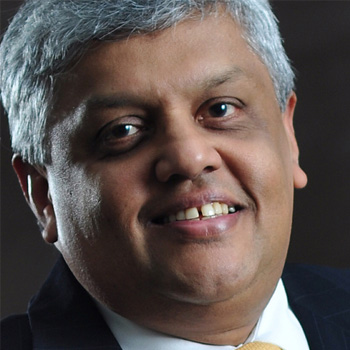 Mano Tittawella
Chairman @ EAP Group
Mr Mano Tittawella is the Chairman/Managing Director of EAP Group. He is also a Member of the Board of Management of the Lakshman Kadirgamar Institute of International Relations & Strategic Studies (LKIIRSS) and serves as Brand Ambassador for H.E. the President’s “Prevention of Kidney Disease” Task Force.
Mr Tittawella was a Senior Presidential Advisor on Economic Affairs and was the Senior Director General – President’s Office from August 2003 to November 2005. He was the first Chairman and the Chief Executive Officer of the Strategic Enterprises Management Agency (SEMA), which was an initiative that he promoted to bring better accountability, good governance and enhanced performance to the largest public enterprises in Sri Lanka. Apart from serving on the Board of National Council for Economic Development (NCED), which was the apex body, coordinating all economic development activities in Sri Lanka, he served as Chairman of Task Force to Rebuild the Nation (TAFREN), which was set-up to handle Post-Tsunami reconstruction and recovery of the Country.
He has also held many other key positions in the State Sector, such as Director General of Public Enterprises Reform Commission (PERC) – the then Privatization Agency of the Government of Sri Lanka and Chairman of People’s Bank, along with many Board positions in some of Sri Lanka’s largest state sector enterprises.
Mr Tittawella has over 15 years’ experience in senior positions in the Private Sector as well. He has held the positions as Head of Research – Jardine Flemming, Sri Lanka, Chief Executive Officer & Managing Director – Lanka Securities (Pvt) Ltd (LSL) – the Stock-broking Company of Merchant Bank of Sri Lanka Ltd (MBSL) and Director – Business Development of MBSL.
Born on 8th May 1960, Mr Tittawella was educated at Royal College Colombo and has an MBA in Capital Markets & Finance from the University of Edinburgh and a Post-graduate Diploma in Human Computer Interaction from the British Open University. He was also a Member of the International Board of Trustees (IBT) of Chartered Institute of Marketing (CIM) UK, from year 2000 to 2003.
Mano Tittawella
Chairman @ EAP Group
Mr Mano Tittawella is the Chairman/Managing Director of EAP Group. He is also a Member of the Board of Management of the Lakshman Kadirgamar Institute of International Relations & Strategic Studies (LKIIRSS) and serves as Brand Ambassador for H.E. the President’s “Prevention of Kidney Disease” Task Force.
Mr Tittawella was a Senior Presidential Advisor on Economic Affairs and was the Senior Director General – President’s Office from August 2003 to November 2005. He was the first Chairman and the Chief Executive Officer of the Strategic Enterprises Management Agency (SEMA), which was an initiative that he promoted to bring better accountability, good governance and enhanced performance to the largest public enterprises in Sri Lanka. Apart from serving on the Board of National Council for Economic Development (NCED), which was the apex body, coordinating all economic development activities in Sri Lanka, he served as Chairman of Task Force to Rebuild the Nation (TAFREN), which was set-up to handle Post-Tsunami reconstruction and recovery of the Country.
He has also held many other key positions in the State Sector, such as Director General of Public Enterprises Reform Commission (PERC) – the then Privatization Agency of the Government of Sri Lanka and Chairman of People’s Bank, along with many Board positions in some of Sri Lanka’s largest state sector enterprises.
Mr Tittawella has over 15 years’ experience in senior positions in the Private Sector as well. He has held the positions as Head of Research – Jardine Flemming, Sri Lanka, Chief Executive Officer & Managing Director – Lanka Securities (Pvt) Ltd (LSL) – the Stock-broking Company of Merchant Bank of Sri Lanka Ltd (MBSL) and Director – Business Development of MBSL.
Born on 8th May 1960, Mr Tittawella was educated at Royal College Colombo and has an MBA in Capital Markets & Finance from the University of Edinburgh and a Post-graduate Diploma in Human Computer Interaction from the British Open University. He was also a Member of the International Board of Trustees (IBT) of Chartered Institute of Marketing (CIM) UK, from year 2000 to 2003.
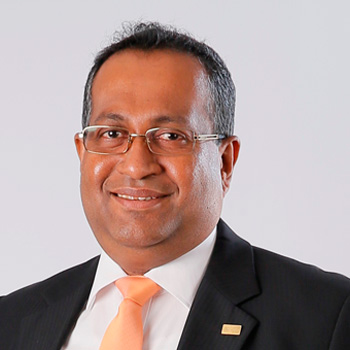 Rajitha Kariyawasan
Managing Director @ Haycarb PLC
Joined Hayleys Group in 2010. Appointed to the Group Management Committee in February 2010. Appointed to the Board of Hayleys PLC in June 2010 Holds a degree in BSc. Eng (Electronics and Telecommunications) from the University of Moratuwa, Sri Lanka. Fellow Member (FCMA) of CIMA, UK. Also a Six Sigma (Continuous Improvement Methodology) Black Belt, certified by the Motorola University, Malaysia. Before joining Hayleys, held the position of Director/General Manager of Ansell Lanka (Pvt) Ltd. Served as the Chairman of the Manufacturing Association of Export Processing Zone, Biyagama. Has responsibility for the Purification Products Sector.
Rajitha Kariyawasan
Managing Director @ Haycarb PLC
Joined Hayleys Group in 2010. Appointed to the Group Management Committee in February 2010. Appointed to the Board of Hayleys PLC in June 2010 Holds a degree in BSc. Eng (Electronics and Telecommunications) from the University of Moratuwa, Sri Lanka. Fellow Member (FCMA) of CIMA, UK. Also a Six Sigma (Continuous Improvement Methodology) Black Belt, certified by the Motorola University, Malaysia. Before joining Hayleys, held the position of Director/General Manager of Ansell Lanka (Pvt) Ltd. Served as the Chairman of the Manufacturing Association of Export Processing Zone, Biyagama. Has responsibility for the Purification Products Sector.
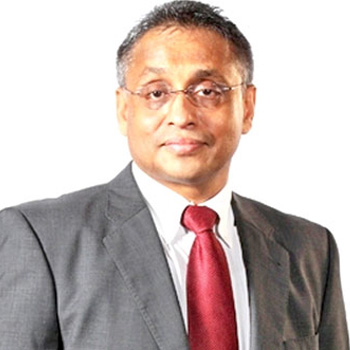 Vajira Kulatilaka
Chairman @ Colombo Stock Exchange
Mr. Kulatilaka holds a B.Sc. in Civil Engineering with a First Class Honours from the University of Moratuwa and a M.Sc. in Industrial Engineering and Management, from the Asian Institute of Technology, Thailand. He is a CFA Charterholder and is a Fellow Member of The Chartered Institute of Management Accountants, UK. Mr. Kulatilaka is the CEO of Investment Banking cluster of NDB Group and is a director of NDB Investment Bank, NDB Stockbrokers Pvt Limited and NDB Aviva Wealth Management Limited. He is at present, a Director of the Colombo Stock Exchange and counts for over 28 years of experience in Banking and Finance and Capital Market operations in Sri Lanka. Prior to joining the NDB Group, he worked at Sampath Bank, USAID and CKN Fund Management (Pvt.) Limited. He has been instrumental in introducing a number of innovative financial products to the country.
Mr. Kulatilaka is a member of several commissions appointed by the Government, Central Bank of Sri Lanka, and The Securities and Exchange Commission of Sri Lanka to develop the country's capital market.
Vajira Kulatilaka
Chairman @ Colombo Stock Exchange
Mr. Kulatilaka holds a B.Sc. in Civil Engineering with a First Class Honours from the University of Moratuwa and a M.Sc. in Industrial Engineering and Management, from the Asian Institute of Technology, Thailand. He is a CFA Charterholder and is a Fellow Member of The Chartered Institute of Management Accountants, UK. Mr. Kulatilaka is the CEO of Investment Banking cluster of NDB Group and is a director of NDB Investment Bank, NDB Stockbrokers Pvt Limited and NDB Aviva Wealth Management Limited. He is at present, a Director of the Colombo Stock Exchange and counts for over 28 years of experience in Banking and Finance and Capital Market operations in Sri Lanka. Prior to joining the NDB Group, he worked at Sampath Bank, USAID and CKN Fund Management (Pvt.) Limited. He has been instrumental in introducing a number of innovative financial products to the country.
Mr. Kulatilaka is a member of several commissions appointed by the Government, Central Bank of Sri Lanka, and The Securities and Exchange Commission of Sri Lanka to develop the country's capital market.
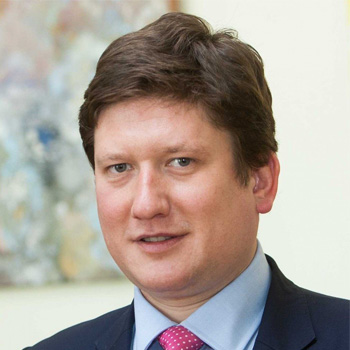 Paulius Kuncinas
Managing Editor, Asia @ Oxford Business Group
Beginning his career with OBG in 2004 as a country editor in Europe, Paulius was promoted to senior editor then group editor, becoming managing editor for Asia in 2008. Based in Kuala Lumpur, he spends most of his time researching and commenting on economic developments in South-East and North Asian countries. With a keen eye on both short-term development and long-term trends, Paulius is one of the leading commentators on the comparative advantages of ASEAN economies.
Paulius Kuncinas
Managing Editor, Asia @ Oxford Business Group
Beginning his career with OBG in 2004 as a country editor in Europe, Paulius was promoted to senior editor then group editor, becoming managing editor for Asia in 2008. Based in Kuala Lumpur, he spends most of his time researching and commenting on economic developments in South-East and North Asian countries. With a keen eye on both short-term development and long-term trends, Paulius is one of the leading commentators on the comparative advantages of ASEAN economies.
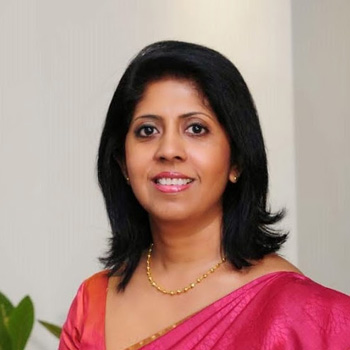 Shashi Kandambi Jassim
Senior Deputy General Manager - Corporate Banking @ Sampath Bank
Shashi Kandambi Jassim
Senior Deputy General Manager - Corporate Banking @ Sampath Bank
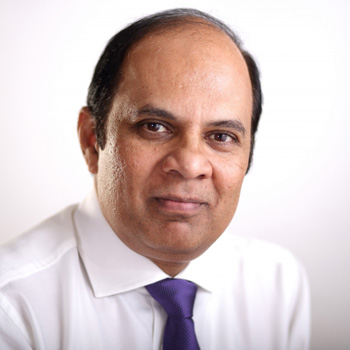 Arjuna Herath
Senior Partner @ Ernst & Young
Mr. Arjuna Herath is a Senior Partner at Ernst & Young, Sri Lanka and Maldives and is the Immediate President of the Institute of Chartered Accountants of Sri Lanka (CA Sri Lanka).
Arjuna served as a Commissioner of the Securities and Exchange Commission of Sri Lanka (SEC) and is presently a Member of the Board of Directors of the Sri Lanka Accounting and Auditing Standards Board. He is also a member of the Statutory Accounting Standards Committee and Statutory Auditing Standards Committee, and also a member of the Joint Committee on Corporate Governance of SEC and CA Sri Lanka. He has served on many boards of corporate entities.
He is also very actively involved international fora in the accounting field and is the Immediate Past President of the South Asian Federation of Accountants (CAPA) and was a Board Member of the Confederation of Asia Pacific Accountants. He is the Chairman designate of the Professional Accountancy Organisation Development Committee of the International Federation of Accountants (IFAC).
Arjuna as a Partner at Ernst & Young is the market leader for Advisory Services in Sri Lanka. He has extensive industry experience of over two decades in serving numerous clients in the Public Sector and in the Private Sector in the areas of Technology, Capital Markets, Market Assessment/Entry, Corporate Restructuring, Performance Improvement, and Corporate Governance.
He is a fellow member of the Institute of Chartered Accountants of Sri Lanka and is Chartered Global Management Accountant. He has a BSc degree from the University of Colombo, and a MBA from the University of Strathclyde in the United Kingdom and a MA in Financial Economics from the University of Colombo.
Arjuna Herath
Senior Partner @ Ernst & Young
Mr. Arjuna Herath is a Senior Partner at Ernst & Young, Sri Lanka and Maldives and is the Immediate President of the Institute of Chartered Accountants of Sri Lanka (CA Sri Lanka).
Arjuna served as a Commissioner of the Securities and Exchange Commission of Sri Lanka (SEC) and is presently a Member of the Board of Directors of the Sri Lanka Accounting and Auditing Standards Board. He is also a member of the Statutory Accounting Standards Committee and Statutory Auditing Standards Committee, and also a member of the Joint Committee on Corporate Governance of SEC and CA Sri Lanka. He has served on many boards of corporate entities.
He is also very actively involved international fora in the accounting field and is the Immediate Past President of the South Asian Federation of Accountants (CAPA) and was a Board Member of the Confederation of Asia Pacific Accountants. He is the Chairman designate of the Professional Accountancy Organisation Development Committee of the International Federation of Accountants (IFAC).
Arjuna as a Partner at Ernst & Young is the market leader for Advisory Services in Sri Lanka. He has extensive industry experience of over two decades in serving numerous clients in the Public Sector and in the Private Sector in the areas of Technology, Capital Markets, Market Assessment/Entry, Corporate Restructuring, Performance Improvement, and Corporate Governance.
He is a fellow member of the Institute of Chartered Accountants of Sri Lanka and is Chartered Global Management Accountant. He has a BSc degree from the University of Colombo, and a MBA from the University of Strathclyde in the United Kingdom and a MA in Financial Economics from the University of Colombo.
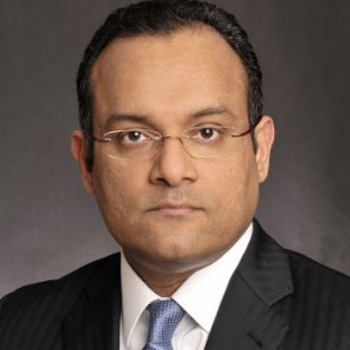 Dee Liyanwela
Executive Director - Exchange Technology @ London Stock Exchange Group
Dee currently heads the offshoring strategy for the London Stock Exchange Group and is also a Director of the LSEG Business Services Sri Lanka. He has over 18 years of experience in managing technology functions in various parts of the globe which include building global offshoring centres and large scale technology platforms. Dee was previously an Executive Director at the London Clearing House (LCH) where he was responsible for Listed Derivatives, Fixed Income and Equities technology operations. Prior to joining LCH, he had worked as a CTO for a specialist software vendor where he was mainly responsible for the setting up and running of a delivery centre from Bangalore, India. Dee began his career working on Mobile Telecommunication Technologies and holds a BA (Hons) in Technology and Finance, a MBA, as well as an Advance Management Programme from Ashridge Management College, UK.
Dee Liyanwela
Executive Director - Exchange Technology @ London Stock Exchange Group
Dee currently heads the offshoring strategy for the London Stock Exchange Group and is also a Director of the LSEG Business Services Sri Lanka. He has over 18 years of experience in managing technology functions in various parts of the globe which include building global offshoring centres and large scale technology platforms. Dee was previously an Executive Director at the London Clearing House (LCH) where he was responsible for Listed Derivatives, Fixed Income and Equities technology operations. Prior to joining LCH, he had worked as a CTO for a specialist software vendor where he was mainly responsible for the setting up and running of a delivery centre from Bangalore, India. Dee began his career working on Mobile Telecommunication Technologies and holds a BA (Hons) in Technology and Finance, a MBA, as well as an Advance Management Programme from Ashridge Management College, UK.
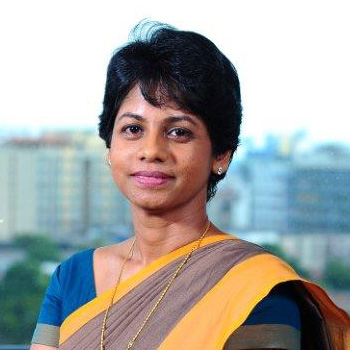 Ruvini Fernando
Executive Director/Joint Managing Director @ Guardian Fund Management
Ruvini Fernando is CEO of Guardian Fund Management Limited, investment managers of the Ceylon Guardian Group and a Director of The Sri Lanka Fund, a country fund dedicated to Sri Lankan equities. The Ceylon Guardian Group presently has business interests in listed and private equity as well as managing mutual funds and institutional client portfolios, a collective portfolio of assets under management of over Rs.35bn. She counts approximately 25 years’ experience in diverse fields of accounting, finance, strategic planning and investment management, of which 10 years have been with the Ceylon Guardian Group. She was a former visiting faculty member of the MBA programme of the Postgraduate Institute of Management (PIM). She is a Fellow of the Chartered Association of Certified Accountants (ACCA), UK and the Chartered Institute of Management Accountants (CIMA), UK and holds a Masters in Business Administration from the PIM, University of Sri Jayewardenepura. She currently serves as member of the Banking, Finance and Capital Markets Committee of the Ceylon Chamber of Commerce.
Ruvini Fernando
Executive Director/Joint Managing Director @ Guardian Fund Management
Ruvini Fernando is CEO of Guardian Fund Management Limited, investment managers of the Ceylon Guardian Group and a Director of The Sri Lanka Fund, a country fund dedicated to Sri Lankan equities. The Ceylon Guardian Group presently has business interests in listed and private equity as well as managing mutual funds and institutional client portfolios, a collective portfolio of assets under management of over Rs.35bn. She counts approximately 25 years’ experience in diverse fields of accounting, finance, strategic planning and investment management, of which 10 years have been with the Ceylon Guardian Group. She was a former visiting faculty member of the MBA programme of the Postgraduate Institute of Management (PIM). She is a Fellow of the Chartered Association of Certified Accountants (ACCA), UK and the Chartered Institute of Management Accountants (CIMA), UK and holds a Masters in Business Administration from the PIM, University of Sri Jayewardenepura. She currently serves as member of the Banking, Finance and Capital Markets Committee of the Ceylon Chamber of Commerce.